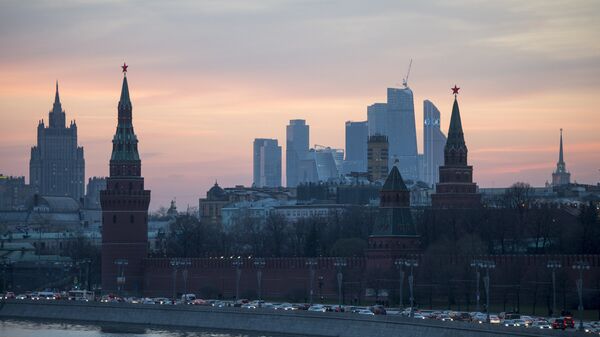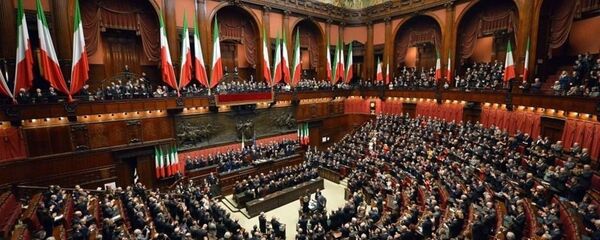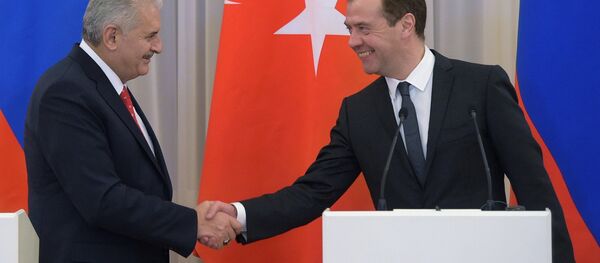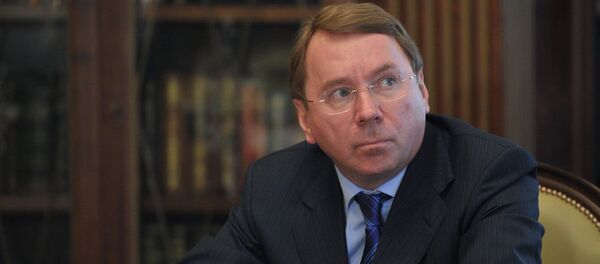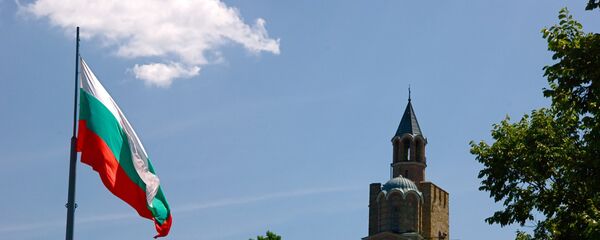The United States itself is very likely to pass over to a warmer stance regarding relations with Russia following the victory of Donald Trump in November presidential election. Who is next to abandon the generally accepted Western anti-Russia policy?
Russia, Turkey – Friends again
After Turkey’s F-16 fighter jet downed the Russian Su-24 combat plane on an anti-terror mission over Syria in November 2015, the damage to relations between the two countries seemed to be irreparable.
Moscow demanded that Ankara apologize for downing the plane and cover any associated material losses to the country and the family of Oleg Peshkov, the pilot killed in the incident, as well as bring those responsible to justice, which did not immediately follow.
In response to Ankara’s refusal to even admit the guilt, what Russian President Vladimir Putin then described as a "stab in the back," Moscow imposed a number of restrictions on Turkey. The retaliatory measures against Ankara included a ban on charter flights in both directions and advice to local tour operators to retain from working with Turkey, as well as certain food imports embargo since January 1, 2016.
"I once again express my sympathy and profound condolences to the family of the Russian pilot who was killed and I apologise to them. I share their grief with all my heart. We look on this Russian pilot’s family as we would a Turkish family and we are ready to undertake any initiative that could lessen the pain and severity of the damage caused," the letter read, as quoted by the Kremlin in the English statement on the issue.
In the letter, Erdogan expressed his deep regret and stressed that Ankara was ready to do everything possible to restore the traditionally friendly relations between Turkey and Russia and also to work together to respond to crisis situations in the region and fight terrorism.
The move was welcomed by the Russian high-profile politicians and paved the way for a gradual restoration of Moscow-Ankara relations.
Right after Erdogan and Putin held a phone conversation on June 29, stressing importance of restoring bilateral ties, the work on reestablishing cooperation in line with the thaw began. Russia started to gradually remove economic and tourist sanctions, which had been in place in the aftermath of the November 2015 incident.
Turkey’s delegation led by Deputy Prime Minister Mehmet Simsek arrived in Moscow in late July in a bid to revive bilateral trade and economic ties. The visit also paved the way for a meeting of Putin and Erdogan in St. Petersburg on August 9.
During the meeting, Putin said that Russia wanted to fully restore ties with Turkey, adding that the sides decided to draft a mid-term program for economic, technical and scientific cooperation for the next three years.
Erdogan said in turn that Ankara wanted to bring ties with Moscow to pre-crisis levels with cooperation in the defense industry sector and energy projects. The Turkish head of state additionally pledged to implement the Turkish Stream natural gas pipeline project, vowing to ensure a route for Russian gas exports heading toward Europe.
The Turkish Stream project, announced by Putin on his state visit to Turkey in late 2014 and suspended over the November 2015 incident, was restarted after a thaw in relations between the two nations.
The pipe-laying work for the Turkish Stream, which is expected to run beneath the Black Sea from Russia to Turkey and continue to a hub on the Turkish-Greek border, from where the gas could be transferred to Southern Europe, is scheduled to begin in 2017 and end in late 2019.
According to Turkish Minister of Economy Nihat Zeybekci, Russia and Turkey have maintained the implementation of joint projects in the sphere of nuclear energy, as well as of energy transportation even during downturn in bilateral relations.
The two countries signed an agreement to construct and operate Turkey’s first nuclear power plant at the Akkuyu site in the Turkish southern Mersin Province in May 2010. The plant is expected to produce about 35 billion kilowatt-hours per year. The project's cost is estimated at about $20 billion. Turkish Prime Minister Binali Yildirim expressed hope on December 6 that exploitation of the first unit of the Akkuyu nuclear power plant would start by 2023 as planned.
As part of restoring bilateral relations, the two nations also pledged to cooperate on anti-terrorism fight, as well as to work on Syrian crisis settlement. On October 3, Turkish ambassador to Russia Umit Yardim said that Moscow and Ankara share the same goals in Syria, for instance, both fight terrorism in the country.
The positive tendency in Moscow-Ankara relations seems to remain unchanged next year. Free trade agreement between Turkey and Russia may be signed at the end of 2017, according to Zeybekci.
Ankara also resumed talks with Moscow on the purchase of Russia’s S-400 next-generation air defense system, the tender for which was announced in 2009 and cncelled following the November 2015 events.
Furthermore, Russia and Turkey are working out a new arrangement for payments in energy trade, Turkey’s Minister of Energy and Natural Resources Berat Albayrak announced on December 9.
Erdogan has stated that Ankara had proposed to Moscow to conduct trade in national currencies. At the same time, a source in the Russian government said that the issue of expanding the share of national currencies in Russia-Turkey trade was not on the agenda.
Turkish Foreign Minister Mevlut Cavusoglu told Sputnik on December 12 that Turkey and Russia had overcome a difficult period in bilateral relations and were boosting cooperation now.
"The problems in our relations with Russia have become a thing of the past. Since this June, there has been gradual intensification of dialogue in Turkish-Russian relations," he said.
Russia regains Bulgaria, Moldova as allies
As relations with Turkey have been reinforcing at full speed, Russia regained Moldova and Bulgaria as allies after the presidential elections in those countries. Unlike their predecessors, Moldovan and Bulgarian new presidents, both elected in mid-November, stuck to a softer stance on Russia.
While outgoing Bulgarian President Rosen Plevneliev has been a vocal critic of Moscow, President-elect Rumen Radev, the former commander of Bulgaria’s Air Force supported by the opposition Socialist Party, has been repeatedly advocating dropping the EU sanctions against Russia, imposed in 2014 over Moscow’s alleged role in Ukrainian conflict, and closer ties with Moscow to help Bulgaria's struggling economy.
The victory of Radev, sympathetic for Russia, was mirrored in Moldova, where Socialist Party candidate Igor Dodon, also known for his friendly stance on Russia, won the presidential elections.
During his election campaign Dodon, who served as the economy minister under a communist government between 2006 and 2009, stressed the need to improve Chisinau's relations with Moscow, especially in economic sphere. He suggested that once he becomes president, Moldova would hold a referendum on whether the country should withdraw from the 2014 political and trade agreement with the European Union and instead join the Russia-led Eurasian economic community.
The economic relations between Moscow and Chisinau deteriorated in summer 2014 after the Moldovan parliament ratified the Association Agreement with the European Union. Russia imposed provisional ban on some Moldovan imports over concerns that free flow of the EU goods would spill to the Russian market in reexport.
The victory of both politicians prompted the majority of Western mass media brand it a victory for Russia and defeat for the European Union, openly calling both Radev and Dodon "pro-Russian candidates."
Russia’s high-ranking officials have welcomed the victories of Radev and Dodon expressing hope for boosting cooperation with both nations.
Putin congratulated the newly-elected presidents on their victory, stressing he was confident it would be possible to boost the political dialogue and expand cooperation with both nations.
Bulgarian Ambassador to Russia Boyko Kotzev told Sputnik in mid-November that Sofia-Moscow relations look set to strengthen after Radev takes office in January.
Bulgarian member of the European Parliament and the country's Socialist Party Momchil Nekov told Sputnik on November 16 that Bulgaria may become a bridge between Russia and the European Union under Radev.
The spokeswoman of Dodon's Party of Socialists, Carmena Lupei, said the newly elected president, whose inauguration exact date has not been set yet, was hoping to pay his first official visit to Russia by the end of 2016.
On Wednesday, Radev told Le Monde newspaper in an interview that Bulgaria's membership in NATO and the European Union does not mean that Russia should be considered by the country as an enemy.
In his victory speech, Radev reiterated his opposition to EU sanctions on Russia and praised US President-elect Donald Trump for "seeking more dialogue" with Putin. But will the United Sates have a change of heart toward Russia under Trump's presidency remains an open question, despite his Russia-friendly statements.
Trump as possible gamechanger in Washington-Moscow relations
During his election campaign, Trump repeatedly called for dialogue with Russia and for combining efforts in fighting terrorism in war-torn Syria. He reaffirmed his willingness to normalize US relations with Russia in his first phone conversation with Putin on November 14.
Russia, which is assisting the Syrian government in fighting terrorist groups in Syria and providing humanitarian aid to Syrian people, assessed Trump's pledges positively.
During his annual address to the Russian parliament on December 1, Putin affirmed commitment to international cooperation, including with the United States.
"Russia is ready to cooperate with the new US Administration, it is important to normalize and develop bilateral relations on an equal and mutually beneficial basis. Cooperation between Russia and the United States in addressing global and regional issues is in the interest of the whole world. We share responsibility for ensuring international security and stability… We hope to join efforts with the United States in the struggle against real, and not imaginary threat. With international terrorism," Putin said.
He added that any attempt to break the strategic parity between Russia and the United States was extremely dangerous and could lead to a global catastrophe, stressing that both countries share the responsibility of ensuring international security and stability in advancing nuclear nonproliferation.
The head of the American Chamber of Commerce in Russia (AmCham), Alexis Rodzianko told Sputnik on December 5 it was likely that would Trump remain faithful to his pre-election campaign promises, setting a course to revamp relations with Russia.
"It is highly likely that Trump will remain committed to the improvement of relations with Russia, or at least make some steps toward Russia," he said, adding that major changes in US foreign policy will indeed take place, and its orientation gives hope for better relations with Moscow.
Trump has spoken of Russia during the election campaign a lot, Rodzianko recalled, noting that the Republican candidate was more open to some changes in the US policy, while his Democratic rival Hillary Clinton was less flexible and adhered to the current stance on the US-Russia ties.
Trump's recent nomination of ExxonMobil Chairman and CEO Rex Tillerson, who in 2013 was awarded the Russian Order of Friendship by Putin and whose oil company is involved in multiple projects in Russia, as secretary of state has been seen by several politicians and analysts as yet another signal of Trump’s intention to normalize relations with Moscow.
Lavrov called Tillerson "pragmatic" and expressed hope that pragmatism would become a solid basis for a future US-Russian relationship.
Kremlin aide Yury Ushakov characterized Tillerson as "respectable and professional," while Kremlin spokesman Dmitry Peskov also praised Tillerson’s professionalism.
Tillerson’s candidature now has to be approved by the US Congress, which may turn out to be difficult, in part because of the candidate’s seemingly positive attitude to Russia.
In December, Sen. John McCain, a prominent member of the Republican Party and a 2008 presidential nominee, said in an interview to Fox News that he was concerned about Tillerson’s relationship with Putin.
France's 2017 presidential election gives hope for Paris-Moscow rapprochement
As France's 2017 presidential election approaches, the prospect of Paris-Moscow relations improvement, in case of victory of a candidate with pro-Russian sentiment, looms on the horizon.
Fillon earned a reputation of pro-Kremlin supporter when three years ago at one symposium in Russia, sitting next to Putin, he criticized French President Francois Hollande's policy as too Atlantist. During his campaign, Fillon reaffirmed on different occasions that he intended to normalize ties with Russia, arguing that France should talk to Putin "without disregarding our differences but without provocations." He also criticized France’s current policy with regard to Syria and hasn't ruled out working with Iran and Syrian President Bashar al-Assad, arguing that France should consider all partners to fight the Islamic State (outlawed in Russia) and Moscow should be a partner in anti-terror fight in Syria, while the European sanctions against Russia should be lifted.
According to Gerard Longuet, the former French defense minister and a lawmaker from The Republicans party, Fillon could narrow differences between Europe and Russia if he becomes France’s next president.
"Francois Fillon would use France’s diplomatic authority to try to reach an agreement between Europe and Russia. We want this agreement. People around Fillon think Russia should be Europe’s partner, it is not about perpetuating a cold war," he said.
Marine Le Pen, currently seen as one of the favorites in the upcoming presidential elections, has repeatedly denounced Western anti-Russia sentiment, as well as sanctions against Moscow, stating that the European Union should seek solution through diplomacy, instead of making threats that could lead to tension escalation.
Le Pen has already stated previously that she respected Putin as he does not allow other countries to impose their decisions on him, and called Putin her soul mate who is protecting the values of the traditional society and Christian heritage.
At the opening of her presidential campaign, Le Pen stated that that if she wins the presidential election, France would cooperate with both Trump and Putin, which would ensure stabilization of global security.
There is no clear evidence of the United States' or the European Union's intention to lift anti-Russia sanctions, however the growing tendency of anti-Moscow sentiment becoming more obscure makes this prospect possible, especially taking into consideration numerous official statements by politicians and businesspeople of all the involved countries that there are much more losses and instability caused by the alienation of Russia than benefits.
